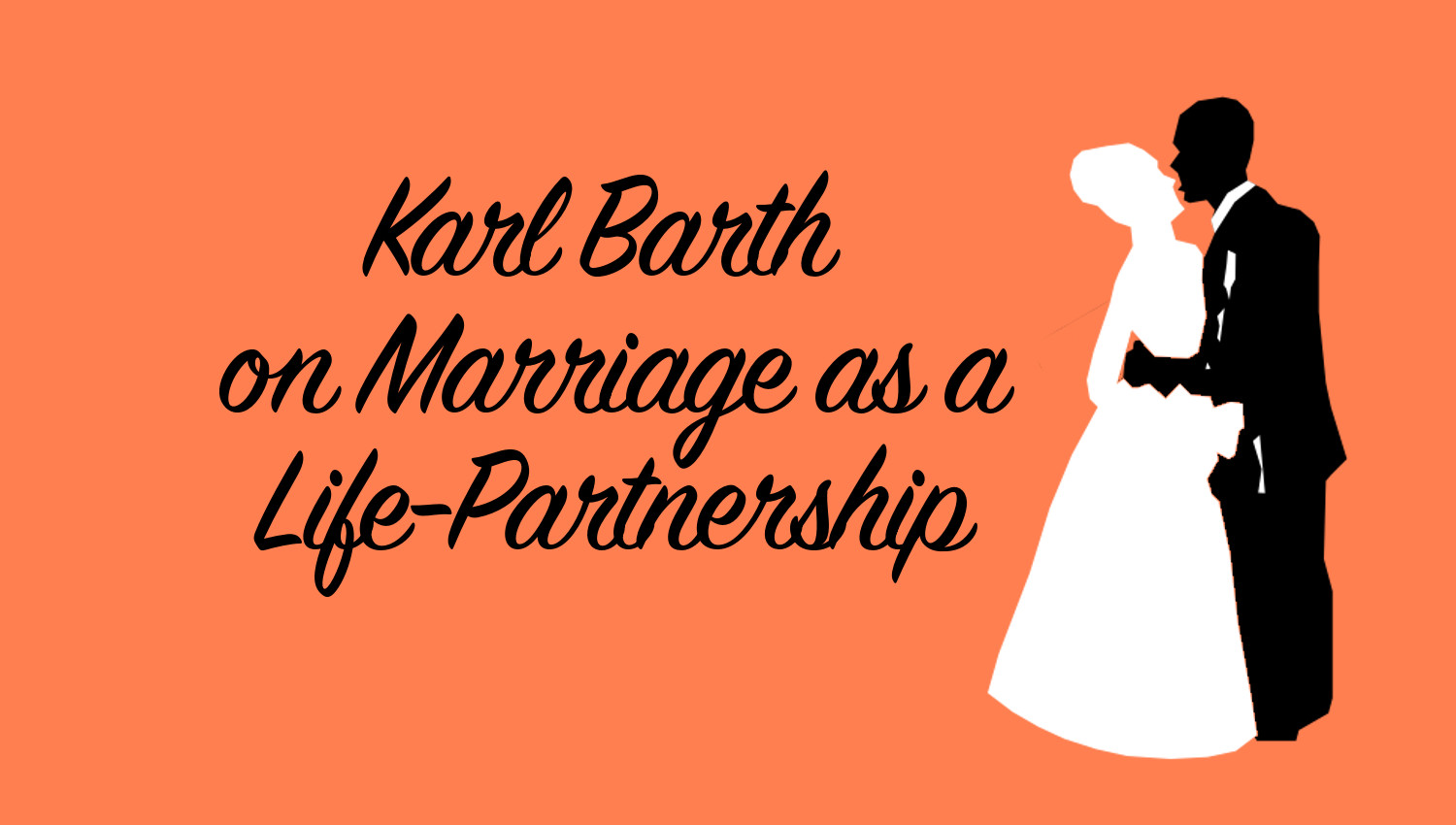 In the Church Dogmatics III/4, §54.1 Man and Woman, Karl Barth provides an outline of "the concepts, ideas and realities" that "make up marriage." Barth begins by defining marriage as "something which fixes and makes concrete the encounter and interrelation of man and woman in the form of the unique, unrepeatable and incomparable encounter and relationship between a particular man and a particular woman." Then, Barth provides a much simpler definition of marriage as a "life-partnership."
In the Church Dogmatics III/4, §54.1 Man and Woman, Karl Barth provides an outline of "the concepts, ideas and realities" that "make up marriage." Barth begins by defining marriage as "something which fixes and makes concrete the encounter and interrelation of man and woman in the form of the unique, unrepeatable and incomparable encounter and relationship between a particular man and a particular woman." Then, Barth provides a much simpler definition of marriage as a "life-partnership."
Barth explains that marriage is a life-partnership between two persons that "lasts as long as the life of both concerned" and it is "not partial but complete" because it "extends over the whole area of the human existence of both participants. It is on both sides a total receiving and giving." In other words, marriage is not a part-time job, and does not allow for time-off for either person involved. It requires 100% from each person, from the beginning until the end of their life-partnership, as the traditional vow says, "so long as you both shall live." Furthermore, Barth says that marriage excludes all forms of polygamy, because it is a life-partnership that leaves no room for a third partner. Barth explains that marriage is limited to two partners because it "is not inclusive but exclusive. No third person can share in it. It is not temporary but permanent. It lasts as long as the life of both concerned."
Barth says that marriage isn't an institution, and it is not something that exists in abstract, or according to the law of the state, or due a sacramental declaration. Two persons may not be forced to marry, because this life-partnership requires each person to freely participate and desire to participate in it. Marriage is an intentional coming together of two persons, a conscious decision by both persons to enter and remain committed to each other in this life-long partnership. Marriage is a "concrete life-partnership between two distinct individuals marriage does not simply exist, nor do they create it of themselves, nor does it spring from somewhere above them, but it takes place in the form of a free resolve and act on the part of both with a view to this lasting fellowship."
Marriage also includes sexual union, where two people are physically joined together. It is a mutual desire for one another, and Barth describes this as "diligere", which is latin for "to love" and stems from the root meaning "to join together," which is another traditional wedding phrase. Barth explains that this life-partnership is characterized by a "resolve and act" by both persons that is "on both sides a choice of love." Barth says that marriage is a life-partnership in "diligere, in which man recognizes woman and woman man as the one and final partner in this fellowship, and they may and must desire and affirm each other, in this special sense and with this special intention."
Lastly, Barth says the exclusive life-partnership of marriage has "significance for others", such as in the event of a wedding. In a wedding, these others acknowledge the life-partnership between two persons, such that this marriage is "accomplished in a definite responsibility to them" through their witness of the beginning of this marriage. These others witness that a marriage life-partnership is ventured, performed and achieved.
Barth ends his outline of marriage with a caveat, that this definition of marriage as life-partnership, does not concern the "psychological, sociological, hygienic and legal aspects of marriage" but it is limited to marriage's "ethical or theologico-ethical problems." Barth says he's determined to assess marriage ethically by being "concerned what is good or bad, obedient or disobedient, in this matter when measured by the command of God." For more information on Karl Barth's theology of marriage, read "§54.1 Man and Woman" from the Church Dogmatics III/4 and his commentary on Genesis 1-3 in the Church Dogmatics III/1.
Source:
- Karl Barth, Church Dogmatics, Vol. 3.1, Sections 40-42: The Doctrine of Creation, Study Edition 13, trans. G. W. Bromiley, J. W. Edwards, O. Bussey, H. Knight, J. K. S. Reid, R. H. Fuller, R. J. Ehrlich, A. T. Mackey, T. H. L. Parker, H. A. Kennedy, J. Marks, (T&T Clark: London, 2010), pages 182-3 [175-6 study edition]



Leave a comment